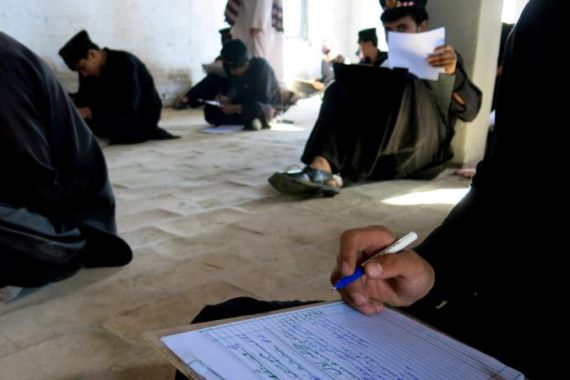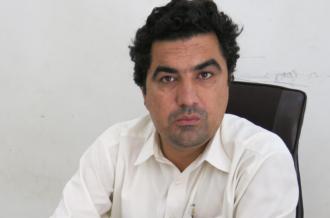Q&A: Pakistan’s children traumatised by war
Aid agencies try to address the education emergency for tens of thousands of children who fled the military offensive.

Bannu, Pakistan – Since June 15, more than 700,000 people have fled the Pakistani tribal area of North Waziristan, as the military continues to carry out a ground and aerial offensive against the armed group Tehreek-e-Taliban Pakistan (TTP) and its allies.
Aid agency Basic Education for Afghan Refugees (BEFARe) has been working with UNICEF to try and address the needs of the more than 300,000 children who are among those who fled the military offensive. BEFARe has been catering to about 6,000 children – but that’s still a tiny proportion of the population that needs access to schools.
Keep reading
list of 4 items‘Triple spending’: Zimbabweans bear cost of changing to new ZiG currency
‘We share with rats’: Neglect, empty promises for S African hostel-dwellers
Thirty years waiting for a house: South Africa’s ‘backyard’ dwellers
Al Jazeera’s Asad Hashim spoke with Ziauddin Afridi, the coordinator of BEFARe, about the education emergency facing the IDP children.
Al Jazeera: What is the extent of the problem?
Ziauddin Afridi: When a family or tribe leaves their home as an IDP, then their first basic problem is of shelter. The second is of food and health .
 |
| Ziauddin Afridi, the coordinator of BEFARe [Asad Hashim/Al Jazeera] |
When a family has shelter, food and health facilities, then after a few days they come to education.
They don’t have much money. The government gives them limited funds of Rs 10-15,000 ($100-150) for their livelihood. That only covers kitchen costs. So that forces them to look at whether there are government or non-government schools available to them. What arrangements has the government made? Can our IDP children get free admission to government schools? The second option is whether aid agencies have opened a school. The third, and last option, is private school, which is out of compulsion.
So in this respect, our organisation, BEFARe is an education specialist organisation. We are working under UNICEF orders to establish a large number of schools within seven days.
Al Jazeera: Who are your schools targeting?
Afridi: We were targeting non school-going children. These children need psycho-social support. So in an emergency, we wanted to enrol them, so that this emergency situation – many had walked the 35km from North Waziristan, others came on camels or other animals. I observed that the IDP children were a little bit frightened, a bit panicked, by the environment [and trauma of leaving home].
So our main focus was to look at kids between ages four and 12, who are usually enrolled in primary school. Right now we have 44 operational schools.
Al Jazeera: What are the major issues in schools in North Waziristan?
Afridi: In [the] Federally Administered Tribal Areas (FATA) the attendance rate [of teachers] tends to be about 10-15 percent. What I have observed is that normally the attendance rate of teachers should be 80-90 percent. And kids were attending school about 50-60 percent of the time. Even in Bannu, the teacher attendance rate is only about 50-60 percent.
| Pakistan’s IDPs |
|
•Pakistan army offensive, Operation Zarb-e-Azb, in North Waziristan begins on June 15
•Zarb-e-Azb means “sharp and cutting strike” in Urdu
•Nearly 700,000 Internally Displaced People, including approximately 300,000 children
•UN says more than 1 million people displaced, including 95,000 families
•Main armed groups operating in the area: Tehreek-e-Taliban Pakistan, Haqqani Network, East Turkestan Islamic Movement, Islamic Movement of Uzbekistan, along with other al-Qaeda factions
•Number of troops deployed in the area: 25,000 to 30,000
|
Al Jazeera: You mentioned psycho-social support. Could you tell us more about that?
Afridi: We have observed that among the IDP children, many were hiding from us, or were silent, or were not making eye contact. When a child is scared or silent, then they will not make eye contact with people around them. So we have given our teachers the special task that they must make eye contact with every child, but especially with those who do not make contact with them or who sit in the back or hide behind other children.
In Waziristan, the ammunition that the army has used, the shelling, has affected everyone: children, parents and even livestock. All were disturbed. And then when they fled, most left by foot. So these children need to be further assessed in order to make a special teaching group where we can give them special care, toys and sports activities. We are making sure these children sit in the front row in classes.
Al Jazeera: The government knew this operation was going to happen before it started. They had the lead time to plan for the school year, and make arrangements for the IDPs. Did they?
Afridi: The education department was ready, but there was no organised camp at that time here. If there was an organised camp beforehand, it would have made it easier for us as well, to cover the entire population within a few days and establish a school.
They are trying, but there are gaps in their results. [Despite government orders], I have not seen any real second school sessions occurring in Bannu district’s government schools. In evening schools, we have the impact of the weather, because the days are shorter in the winter. Often the city shuts down by about 5:00pm , so IDP families do not want their children to be out after sunset.
Al Jazeera: Why is UNICEF not working in the Bakkakhel IDP camp, the only IDP camp to be established by the army and government?
Afridi: The policy is that there is district coordination between UNICEF and the army, but as a UN humanitarian organisation, UNICEF’s stand is that as long as the army is administering the Bakkakhel camp, until they do not delegate the authority to local district government, then we cannot carry out a direct intervention in that camp.
Because there are security protocols that the UN cannot break.
Al Jazeera: Long term, what is the expectation for this situation to continue?
Afridi: So far, we have not got a clue about this. We are asked this question all the time by elders among the IDPs. The planning regarding their repatriation is to be done by the district government and the army. Even once areas are declared clear, infrastructure in North Waziristan has been damaged. Roads, buildings have to be reconstructed. And the IDPs have gotten used to living in cities, where there are markets [and other facilities]. They have adjusted very quickly, so it’s difficult for them to go back to North Waziristan, which is completely undeveloped.
Afridi’s comments have been edited slightly for clarity and length.
Follow Asad Hashim on Twitter: @AsadHashim